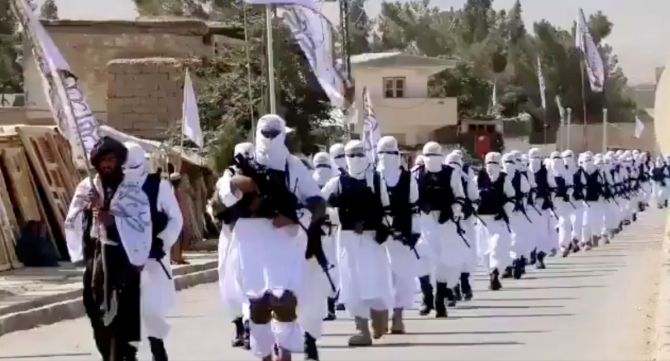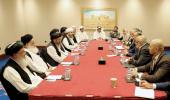The US has the distinction of destroying a flawed but functioning State thrice since 1979.
Pakistan has been their constant accomplice, explains Shekhar Gupta.

With a speedy Taliban conquest, Afghanistan is dominating global news headlines and commentary.
Please note how almost 90 per cent of all the commentary and debate is about what it means to other countries, from the US to India to China and, of course, Pakistan.
Very little time and emotion is being invested in the country to which it matters most of all.
Afghanistan and its nearly four crore (40 million) people.
Amazing, no? Actually, it isn't. It was as inevitable as the Taliban victory once the Americans bought their special envoy Zalmay Khalilzad's idea of a minimum plausible deal.
Minimum in that the Americans should be able to return without getting their backsides peppered by Taliban bullets.
Afghans be damned. Now, of course, even that is looking dicey as the Americans are begging the Taliban to at least spare their embassy.
Khalilzad is an Afghan born in the northern city of Mazar-e-Sharif, and a Pashtun from the Noorzai clan.
He has not allowed his knowledge of his parent country's history, ethnicity, and the fate of his people to be 'coloure'" by his first class American education. He knows what his fellow Afghans are fated to deserve. Exactly what he might have left his homeland for America.
Eternal conflict, anarchy, Islamism of one shade or the other and another war in the course of time.
So, get the hell out of here. Just as he had done as a US-bound teenager through an inter-cultural school students' exchange scheme. Smart people do not belong here.
Good education can give you intellect, not sensitivity.
It's something either God gave you, or didn't.
The fact is, Afghanistan actually has a lot many smart people left.
Look, for brilliance of its brilliant cricket team.

But if you know its history, or have also lived through a part of it as Khalilzad did, you could easily get heartless.
Through its history, or at least for the about two centuries since the big powers discovered it and what its location means to their own geo-strategic interests, Afghanistan and its people have got the same awful deal.
For Imperial Britain, it was the buffer State they needed between themselves and the powerful Russian Empire.
Their military efforts to control it suffered infamous early setbacks, but they persisted.
Finally, after the two Anglo-Afghan wars in the 19th century that left lots of Afghans dead and ruined, they signed one of those treaties only a colonial power offers a defeated one.
A notion of retained sovereignty in return for control over its foreign and strategic polices. A perfect buffer state.
Mortimer Durand made the Afghan ruler sign off on a border he drew with colonial India, the so-called Durand Line.
On paper, the Afghan ruler was sovereign, in reality, after the second Anglo-Afghan War, the British controlled its military and foreign policies.
It was like Durand was negotiating with himself on the other side of the table.
No surprise that no credible Afghan ruler or regime ever recognised this border.
After 1947, it has kept Pakistan deeply invested in Afghanistan's affairs for 75 years now.
For nearly four decades, Afghanistan became the Soviet Union's buffer State to its south-east, especially for its vulnerable Central Asian underbelly.
If you have a one-dimensional view of your strategic interests, as the Pakistan compulsively does, it was a historic opportunity.
If Afghanistan was the Soviet buffer State, Pakistan was a natural American ally.
The only dimension that matters for the Pakistani strategic mind is leverage against India.
They monetised that lottery of becoming a frontline State against Communist expansion only to strengthen their economy and military vis-a-vis India. They failed to translate it into any gains.
On the other hand, they fought two self-destructive wars with India, and lost half their country in 1971.
Pakistan's catastrophe was self-inflicted between 1954 and 1971, but respite for Afghanistan was brief, if any.
Soon enough, Pakistan and its agencies, along with Western allies were playing power games in Kabul to topple the pro-Soviet regimes and replace them with friendlier, Islamist ones.
This brought the Soviet invasion of 1979.
Led by the US, the entire Western bloc, the Islamic world and China joined in to arm, finance and build the Mujahideen.
Millions of Afghans died and nearly 10 million became refugees in the fighting that ensued.
Pakistan, India on its mind, was again a frontline State and the goodies pipeline had reopened.
The Soviets left in 1989, and because Pakistan believed it had defeated a superpower, it wasn't going to let the Soviet- and India-friendly Najibullah regime survive. They kept helping the Mujahideen to defeat it.
Eventually they were in control of Kabul. But they weren't done yet.
The Mujahideen were divided, too many leaders had minds of their own, and Pakistan wanted a more cohesive vassal in Kabul.

That's why the string of madrassas was set up that taught the Taliban (young Afghan students) the most fundamentalist version of Islam, and trained them only for one thing, to fight wars.
Again, lots of Afghans died as the Taliban now pushed out the Mujahideen and imposed their own version of a shariah regime.
Lots of talented young Afghans, just like Khalilzad might have done in the 1960s, left.
The country lost talent, capital and culture.
It got, in exchange, al-Qaeda and other proliferations of religious extremism.
Which, eventually, brought the Americans again after 9/11.
Between 1979 and 2021, the Americans have now broken Afghanistan, a functioning State whatever its flaws, three times and left millions dead in their wake.
They defeated the Soviets but dumped Afghanistan once that purpose was served.
They returned in 2001 with the grandiosely named Operation Enduring Freedom, with the promise of destroying the Taliban and building a modern, new, democratic Afghanistan.
In 2021, they dump Afghanistan, destroying a functional State yet again.
Why, because they now decided that all they needed was a safe and dignified retreat that didn't look like a defeat.
The first objective, safety, might be achieved. The second has been lost.
The US, therefore, has the distinction of destroying a flawed but functioning State thrice since 1979. Pakistan has been their constant accomplice.
A lot of Afghans will die again.
Yet another generation of educated elites will flee, and women will be back where the Taliban want them to be.
Safe, probably, but condemned to lives their view of Shariah entitles them to.
The reason we have a new, educated Afghan elite is that this time the Americans didn't just fight a war.
They also invested time, money and emotion in nation-building.
Never mind that President Joe Biden now dismissively says that was never the idea.
In the 20 years of what we might call American occupation, the Afghan population made great strides.
I spotted the data in a tweet by Washington-based strategic scholar Dhruva Jaishankar quoting World Bank data on the change in Afghanistan between 2000 and 2018.
Most important indicator first: Life expectancy.
It went up from 56 to 65 years. Gross primary school enrolment from 21 per cent to a 104.
Female adult literacy climbed from 17 to 30, access to electricity from 22 to 99 and per capita GDP nearly doubled, from $1,190 to $2,034.

This is what the Americans helped create, but only because the Afghans had the ability, hunger and ambition for modernity and change.
Now, on the 20th anniversary of 9/11, they return Afghanistan to the brutal regime they had dislodged in 2001.
It now faces one of three possibilities.
The least worst, the Taliban establish their Islamic emirate, governed by their rules.
The less worse, that as happened in the earlier Taliban era, at least some parts of the country stay out of Taliban control.
And the worst, that fighting continues, with Pakistan, China, Russia and Iran messing about as Afghan factions kill each other.
In other words, a Syria on the top of South Asia.
Any which way, the hapless Afghans won't have much say.
By Special Arrangement with The Print
Feature Presentation: Aslam Hunani/Rediff.com










 © 2025
© 2025